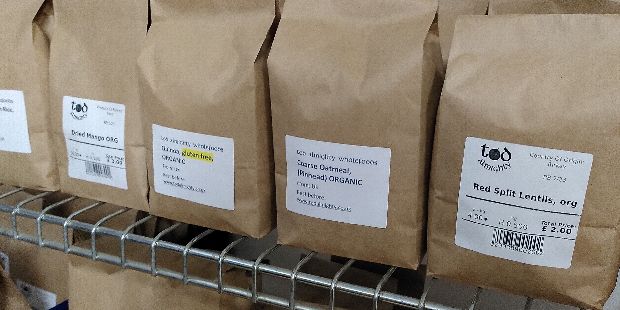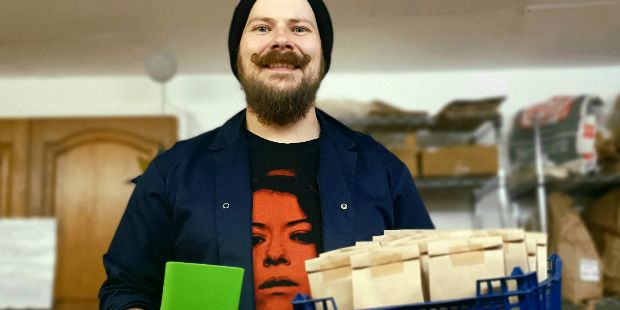

As you might know or expect from a refill shop, we are all about reducing plastic waste. So we don’t sell plastic bags and try to avoid plastic as much as we can. We buy almost all our wholefoods in bulk and sell them either from the dispensers into our customers’ own containers, or we bag them up ourselves into paper or cellophane bags.
Now, we’re no experts, but we know that the “which bag is best” question is full of controversy and very complicated! As far as using resources go, plastic bags are by far the most environmentally friendly, believe it or not – they are usually made from waste products of the oil industry, they are tough and strong, lightweight, waterproof, and are able to be used repeatedly. The trouble with them is that very indestructability – they take hundreds of years to break down in the environment and then they end up as microplastics which are about the worst thing we are littering the earth with. They are technically able to be recycled but in practice rarely are. And we use hundreds of billions of them every year! So in my opinion we should just stop using them, full stop.
But what about cellophane bags? They are made from plant starch – usually either wood, potato or corn. They take more resources to make but at least they are 100% biodegradable and compostable. Up until now we have been using them in the shop for bagged up salads, muesli, nuts, seeds, dried fruit etc, in fact for most of our wholefoods. We like them as they are transparent so you can see what is inside, waterproof, relatively tough and fairly cheap (nowhere near as cheap as plastic, of course!) The trouble with them is that unless you have a really good hot home compost bin they take a very long time to decompose. So most people put them in the “general rubbish” which means they end up in landfill. They could theoretically go into the council’s food waste recycling bins but they look too much like plastic bags so the councils won’t accept them. And in landfill they act like food waste in that as they break down they give off methane gas, one of the major greenhouse gases.
What about cotton or jute? We do sell recycled fair trade cotton string bags, jute strong shopping bags, and small cotton bags for veg and dry wholefoods. These have by far the heaviest environmental footprint in terms of resources to produce them, but can be used hundreds of times (as long as you remember to bring them with you!) But they are not much good for us bagging up stock in the stop. And they are expensive.
So that leaves paper. Paper bags use a lot more resources to make them than plastic – they come from trees, which are cut down in order to make the paper, they are heavy and not very strong so it is more difficult (but not impossible) to reuse them. They aren’t suitable for anything that is wet or has oil or juice on it, and they aren’t transparent so you can’t see what’s inside. However, even bearing all that in mind I still think they are the best option of all the bags as they are both compostable, biodegradable AND can be endlessly and easily recycled, which has the capacity to seriously increase their efficiency.
So, all this is building up to an announcement from Tod Almighty about our bagging up – we have now vastly increased our use of paper bags rather than cellophane – Tadaa! – see photo. The bags we are using are the type known as “kraft” which are unbleached brown block bottomed paper bags, reasonably strong, and we make sure they are appropriately labelled. There always will be some items of stock that will have to continue being bagged up into cellophane but we are reducing them down as much as we can.
By the way, by FAR the best way of doing your shopping of course is to bring your own containers and REFILL them – thereby avoiding packaging altogether! We support the #justonebottle campaign which has been set up to publicise and encourage refilling. We love it when our customers do that but we are aware that it isn’t always possible. And we want our customers to have the opportunity to eat the decent healthy organic wholefoods that are inside the bags, however they get them home.
Life, for most of us, is a compromise. I don’t really believe in perfection. But I do think we owe it to the earth and everything in it to try to do what we can to reduce our impact on it.
